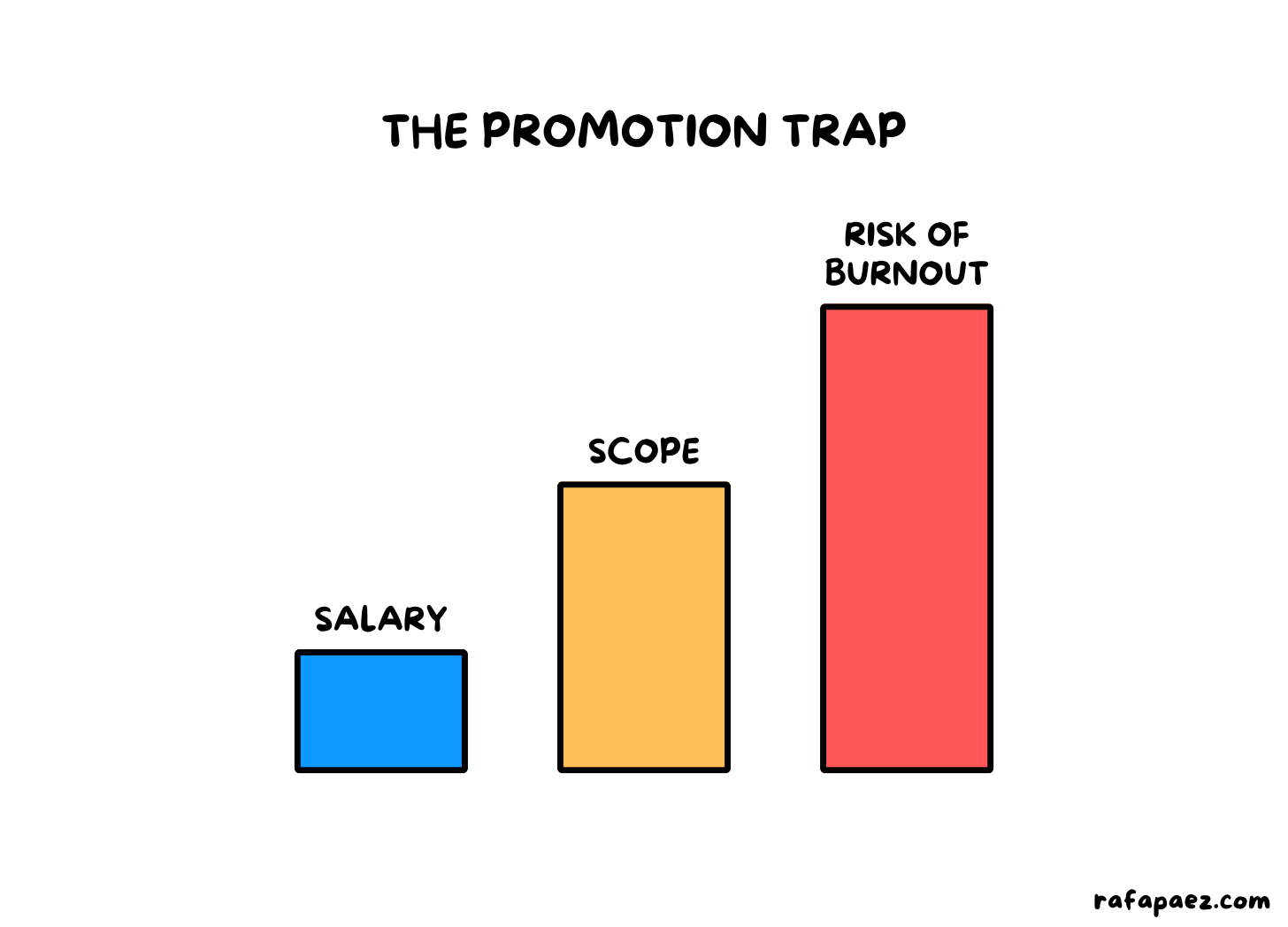The Promotion Trap: Why You Should Stop Chasing Titles
Titles and Promotions Won’t Make You Happy—But Growth and Impact Will
Climbing the career ladder isn’t the only way to grow. In fact, sometimes it’s the fastest path to burnout.
What if actively choosing not to chase promotions could become one of your best career decisions?
Promotions often seem like the ultimate measure of success—higher pay, a flashy job title, and an impressive LinkedIn profile. Yet many who relentlessly pursue this traditional form of success quickly discover that reality isn’t as fulfilling as it appears.
In this article, I’ll reassure you that it’s perfectly okay—and often wiser—to stop chasing the next promotion, whether you decline it or never even get offered the next one.
Why I Stopped Chasing Titles
Some years ago, I was a Senior Engineering Manager, just one step from becoming Head of Engineering of a great scaleup. By traditional standards, I was quickly climbing. Then I made a decision that confused many colleagues: I left that role for an Engineering Manager position at a fast-growing international startup.
On paper, it looked like a demotion. In reality, it was an upgrade—in responsibilities, impact, and purpose. My title shrank, yet my scope expanded significantly. I led team leaders and staff engineers, tackling more complex challenges.
Ironically, at many companies, my responsibilities could easily have warranted a Head or even Director title. This inconsistency highlights a broader issue: titles are inconsistent across organizations and rarely reflect reality.
Don’t get me wrong—titles matter. They open doors, convey credibility, and mark progress. But titles alone don’t define your value or organizational impact. What truly matters is your work, behaviors, leadership, and the problems you solve.
I stopped chasing titles because I realized they don’t define my worth or determine my impact. My actions matter, not the title on my LinkedIn profile.
Before stressing over job titles, ask yourself: Am I truly growing, or am I just collecting labels?
The Uncomfortable Truth About Promotions
Like many, I once believed promotions directly equaled growth. I was wrong.
Early in your career, promotions feel essential, especially in an “up or out” culture—either you get promoted, or you risk losing your job.
However, once you reach senior roles, the reality shifts dramatically. Promotions become less about your skill and more about the perception the right people have of you. Relationships, internal politics, and visibility often outweigh genuine competence and hard impactful work.
Sylvia Ann Hewlett captures this bluntly in Executive Presence:
“Being perceived as leadership material is as crucial as actual accomplishments.”
Advancement, therefore, isn’t just about competence—it’s about fitting a particular leadership mold. That can feel deeply unfair if you believe promotions should be merit-based.
Depending on your company, leadership, and personal values, this might be a game you don’t want to play.
Why Chasing a Promotion May End Badly
Chasing promotions can feel exciting, but it’s also a gamble—one that can easily lead to frustration, disappointment, or burnout. Here’s why.
a) If you don’t get the promotion
Imagine spending months or even years tackling high-stakes projects, resolving team conflicts, expanding your teams, and driving success across the entire engineering organization—fully expecting that all this hard work will secure your next promotion. Then the announcement comes—and your name is not on the list.
It’s a bitter pill. You feel undervalued, overlooked, and question whether the extra effort was worth it.
But here’s a harsh truth: treating promotions as ultimate validation rarely ends well. It often leads to bitterness or burnout, neither of which fosters effective leadership or a fulfilling career.
b) If you do get the promotion
Surprisingly, achieving the promotion can be equally risky. While it might include a modest salary increase, it often brings significant additional workload, stress, and much higher expectations.
Consider the hidden imbalance of promotions:
Salary → Slight increase
Scope of Responsibilities → Noticeable increase
Risk of Burnout → Significant increase
Suddenly, what felt like a reward can become a burden. Pressure intensifies, and if you’re not aligned with leadership or ready for extra responsibilities, the promotion could make you miserable.
The lesson? Promotions aren’t magic fixes for career growth or satisfaction. Blindly chasing them may land you in roles you never wanted—or worse, ones that drain you.
Are You Climbing the Right Ladder?
We often treat careers like video games, relentlessly chasing the next level. But ask yourself: Is the next level truly where you want to be?
Before fixating on promotions, reflect on what genuinely drives you. Is it higher salary and status or something deeper—personal growth, meaningful challenges, or alignment with your values?
Promotions, especially into management roles, often mean sacrificing technical work you love for increased stress from managing teams, navigating politics, and juggling competing priorities.
Camille Fournier, author of The Manager’s Path, wisely points out:
“Management is a career change, not a promotion. Treat it that way.”
Becoming a manager means redefining your career, often stepping away from beloved technical work to face new challenges.
If management isn’t the right path for you, consider staying on the technical track. Many companies today offer Staff Engineer or Principal Engineer roles, allowing you to grow and advance without stepping into management.
Growth Beyond Promotions
True career growth isn’t just about climbing upwards—it’s about expanding your impact. Whether you’re an engineer (individual contributor) or a people manager, there are many ways to grow without chasing a new title.
Here are some meaningful ways to develop your career:
For Individual Contributors
Mentoring & Pair Programming: Elevating junior engineers, improving the team’s skillset and best practices.
Specialization: Becoming the go-to expert in performance optimization, security, infrastructure, or AI/ML.
Owning Large-Scale Systems: Leading critical technical areas and cross-teams initiatives that drive significant business impact.
For Engineering Leaders
Building High-Performing Teams: Fostering autonomy, accountability, and continuous improvement.
Scaling Organizations: Optimizing hiring, onboarding, and organizational structures.
Influencing Strategy: Aligning engineering efforts with broader strategic business objectives.
A bigger title doesn’t always mean true progress or fulfillment. Instead of chasing promotions, invest in the areas that excite you. True career growth happens when you increase your impact, not just your job title.
Final Thoughts
Titles and promotions are appealing milestones—easy to measure and publicly recognized. But they are not the key to long-term success or happiness.
Instead of chasing titles, seek genuine growth, deeper challenges, and authentic fulfillment. Your career will flourish when you pursue impact rather than status.
Before chasing your next title, pause and reflect: Are you seeking genuine growth, or just chasing validation?
Enjoyed the article? Hit the ❤️ button and share it with others who might find it helpful. Subscribe to support my work and stay updated on future issues!




Great job, man.😄😉 He tenido que utilizar el traductor de Apple en algunos párrafos.😁 Pero más o menos lo entiendo.
Thanks for sharing!
I think the point is to enjoy the process. As we enjoy doing our job, we gradually create bigger impact and move forward. If we are not ready but chase that senior title, it's going to create false expectations and unreasonable workload.
For those who care about titles, starting your own company is the fastest way to be "CEO" or "CTO" 😄